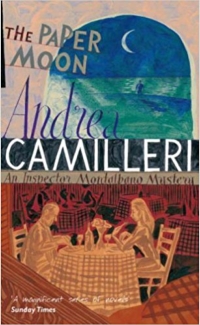|
'She stepped
forward.
"'bye, see you
soon," said Montalbano, running for the door, opening it and dashing out on to
the landing before the cheetah could spring, grab him in her claws and eat him
alive.' (Paper Moon, p. 206)
If these women --
Michela, Eleana, Paola the Red et al didn't have double/secret lives going on,
there'd be no case for Montalbano and no story for Camilleri. And none of these
women appear to tell the full truth in their initial interviews, so that
Montalbano is always left with having to figure out back stories that drag out
the action and force Montalbano to use blackmail to get at the truth. In terms
of sexual misconduct, all are guilty. All are willing to use sex to corrupt
Montalbano if possible, so that the narrative becomes extended foreplay rather
than an inquest into a suspicious death.
The plot in Paper Moon
might be layered, yet the murderer is fairly obvious from the start. The main
purpose of the story is to examine M.'s fear of aging and how he compensates by
allowing attractive delinquent women to go free. Here justice (or is it the
law, which is a different thing) is a sham, a cover-up rationalized as
pragmatic. Realpolitik, some might argue. Yet M's solution --
paradoxically -- seems more like a conservative response to sustaining the
socio-political status quo. On a psychological level, you might wonder if the
Inspector's cover-up is a form of paternalism or vanity... or even worse, a
rooted Oedipus Complex. M. is getting old. His inverse sexism reeks of
insecurity and the need to look good in women's eyes. Indeed, their eyes appear
to be the trap into which he is often falling. Women cannot be held responsible
-- even for murder -- as beauty trumps evil, and if he can rationalize the
action as justifiable homicide, hey, just let her go free.
In the early novels,
Montalbano's actions seemed moral, necessary corrections in a legal code
stacked against the weak and disadvantaged. Now he looks like a patsy. He
allows Michela -- who is guilty of conspiracy, incest and murder -- to commit
suicide rather than face arrest or exposure. Some will say her suicide was
beyond his control, yet it's clear than he had no intention of charging her,
that all he wanted was her admission and the missing details. In The Patience
of the Spider, he allows a young woman to walk who stages her own kidnapping in
order to blackmail a relative into repaying a large sum of money to her
impoverished parents. So there always seem to be extenuating circumstances that
allow Montalbano to play good cop (feel alright/ on a warm Vigàta
night). He, and only he, has the right to understand the mystery. The evidence
is jigged for the books, and he plays the confessor.
You could look to
Hollywood film noir or the history of ancient Rome for the root of these
Camillerian sirens. In the Potter's Field (2011), Camilleri introduces a
Colombian femme fatale who reduces M.'s subordinate Assistant Inspector
Mimi Augello to a shagged-out shadow... meanwhile, you've been to the Vatican
Library and read Procopius's infamous Secret History about the insatiable
Empress Theadora, know these dangerous women are always out there.
Fun, isn't
it?
© LR April
2017
*Check out LR's
OUTLAW
ACADEMIC »»
or LR's novel
RADIO
BRAZIL »»
|
